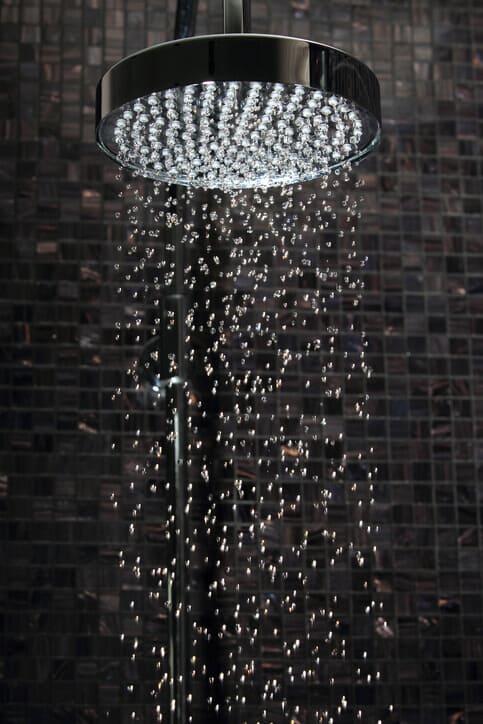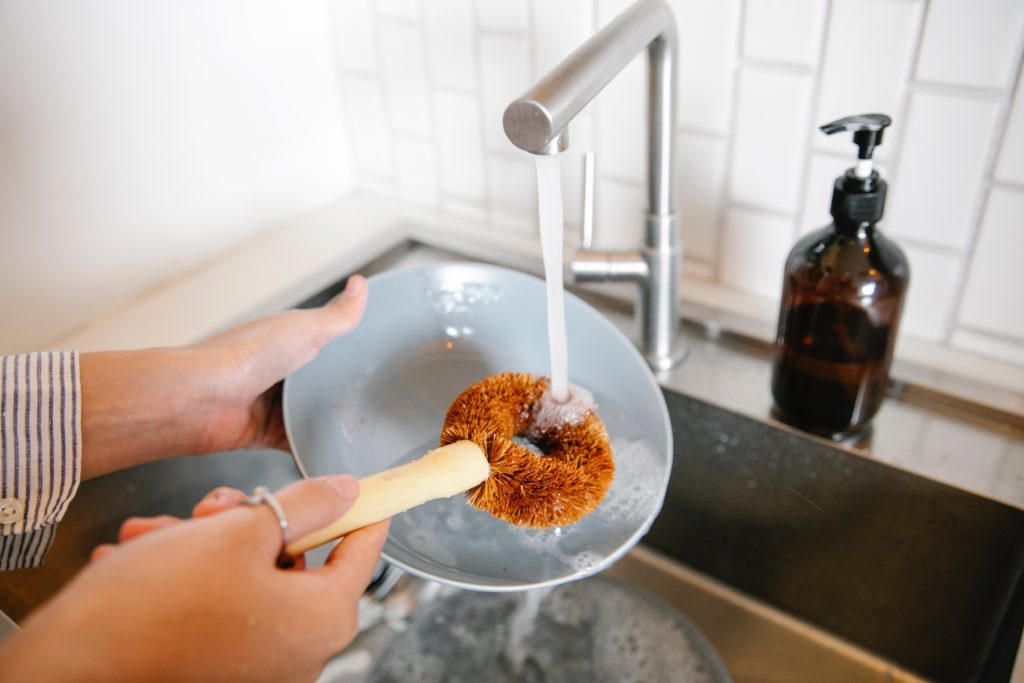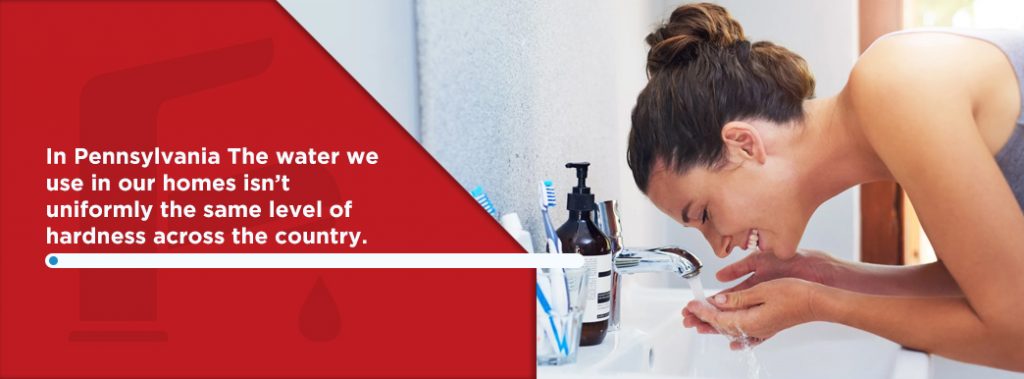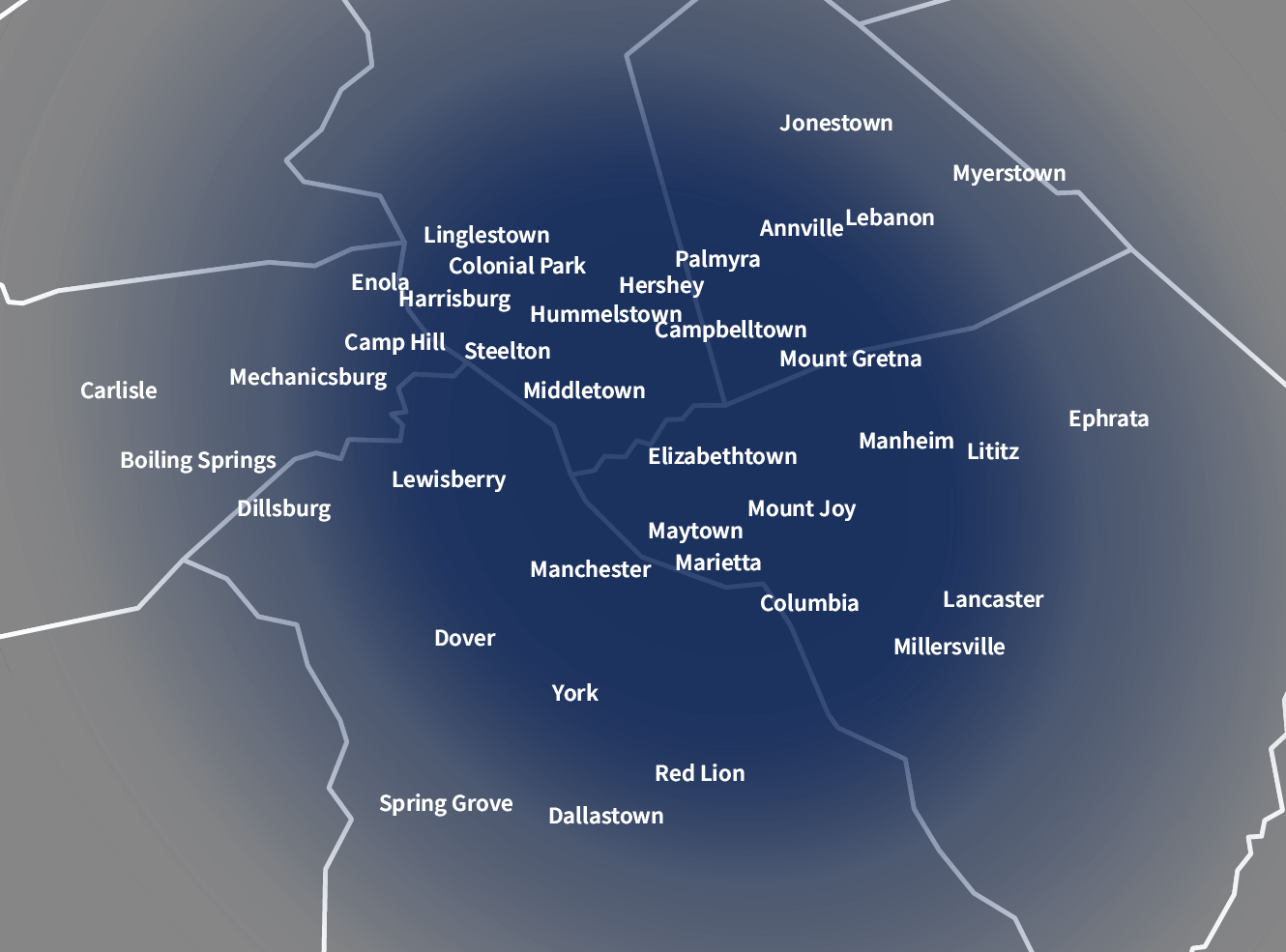
Save up to $350 * on Water Softeners
A new water softener can make a big difference. Cleaner hair, spot-free dishes, and no more scaly deposits so your appliances work better and last longer.

Disclaimer: *Savings on select systems only. Restrictions may apply. See dealer for details.
When you take a shower, do you notice that your shampoo or soap don’t seem to lather as well as they do when you’re at a hotel or someone else’s home? Are the walls of your shower or bath covered in a film of soap scum? Have you noticed flaky white or green deposits forming around your showerhead and faucets? If so, you probably have hard water.
“Hard” water doesn’t look different from “soft” water. It won’t make you sick if you drink it or cause other health problems.
Hard water does have a slightly different feel, and it will interfere with your home’s plumbing and make it more challenging for you to soap up and clean up. Serving customers in Elizabethtown and Central Pennsylvania, Home Climates is committed to bringing soft water into people’s homes and helping homeowners find the right solution for their particular needs.
Why should you care about the softness or hardness of your water? Read on to learn more about the issues caused by hard water and how a water softener or water conditioning service can benefit you.
What Are the Effects of Hard Water?
Although hard water isn’t necessarily a health hazard and is safe to drink, it can have several unwanted effects. If you have hard water at home, you’re likely to see or experience the following:
- Water with a strong smell or taste: While hard water is usually safe to drink, you might notice that the water that comes out of your taps has a “taste” or a distinct odor. Sometimes, hard water can smell like rotten eggs, thanks to the presence of sulfur in the water. Hard water might also have a metallic taste if there is dissolved iron in it.
- Stains on surfaces: If you get a bit of water on a surface, such as a countertop or a faucet, it will eventually dry and evaporate away. The dissolved minerals in the water can’t evaporate, so they get left behind. Over time, these minerals build up, creating stains or marks on various surfaces. You might see green flakes on your faucets or rust-colored streaks in your sinks or toilet bowls. While the stains are relatively easy to remove with some vinegar and a bit of elbow grease, they will keep recurring as long as you have hard water.
- Higher than usual energy bills: The buildup of minerals, such as scale, due to hard water can reduce the efficiency of specific home appliances. For example, one study found that hard water increased the energy usage of water heaters by 24 percent.
- Short-lived appliances: Hard water also often causes more wear and tear on appliances that use water, such as washing machines, dishwashers and refrigerators. Hard water can even affect your coffee maker. That can mean that your appliances last for much less time than they would if your home had soft water. Having to replace your washing machine and other appliances more frequently or having to call in the repair person often can add up.
- Plumbing troubles: The same scale that creates stains on your sinks and counters and reduces the efficiency of your water heater can also cause trouble with the pipes in your home. The buildup of calcium and other mineral deposits can reduce the flow of water through your home’s pipes, leading to clogs and reducing water flow from soap scum building up. At the least, it can mean that you need to break out the plunger more often. At the most, it can mean that you’ve got the plumber’s number on speed dial.
- Skin issues: The minerals found in hard water can make it difficult to get a good lather when you soap up in the bath or shower. Hard water is also more difficult to rinse away cleanly, meaning it can leave behind a film on your skin. That film can dry out your skin and irritate it.
- Laundry problems: Just as hard water makes it difficult to fully rinse your skin, it also makes it difficult to fully rinse detergent out of clothes when you launder them. That can mean your clothes come out of the wash dirtier than when they went in. Hard water buildup on clothing can also shorten the lifespan of your wardrobe, meaning you’ve got to replace your clothes more frequently. Hard water doesn’t only affect your clothes — it can also affect your linens. Towels and bed linens washed in hard water often feel scratchier and stiffer.
What Does Hard Water Mean?
So what exactly does it mean to have hard water? Water that’s hard has a high level of dissolved minerals in it. Those minerals are most often magnesium or calcium, but they can be other minerals and metals as well. Across the U.S., water hardness is classified by grains per gallon. The classification system examines the amount of calcium carbonate in the water.
- Soft: 0 to 3 grains per gallon
- Moderately Hard: 4 to 7 grains per gallon
- Hard: 8 to 11 grains per gallon
- Very Hard: 12 to 15 grains per gallon
- Extremely Hard: More than 15 grains per gallon
At this point, you might be thinking back to your high school chemistry classes and remembering that water is made up of two elements — hydrogen and oxygen. How can it also contain other minerals like calcium and calcium carbonate?
Although the molecular structure of water is H2O, water also happens to be an excellent solvent. When it is flowing underground, winding its way through rocks and soil, it can dissolve some of those rocks and pick up parts of that soil. Water is a particularly good solvent for magnesium and calcium, which is why you often find those two minerals in hard water.
Who Usually Has Hard Water Problems?
Some areas of the U.S. are more likely to have hard water than other areas because the water in those regions naturally has a high level of dissolved minerals.
Hard water isn’t always determined by geographical area alone, though. Other factors can contribute to water hardness, such as the source of the water supply. People with the following water sources might face hard water problems:
- Well Water: Water sourced from underground is much more likely to be hard because it is much more likely to come into contact with minerals. Well water is also less likely to be treated than water from a municipal supply, meaning it is more likely to have metals in it such as iron.
- City Water: Whether the water from a city or municipal supply is hard or soft depends in large part on the source of the water. In some cases, cities that source their water from rivers are more likely to have soft water. It’s also possible for city water to come from multiple sources, meaning that it is hard in some areas and softer in others. That’s the case in New York City, where some of the water comes from the Catskill/Delaware watershed and is soft while some parts of the city receive water from the Croton watershed, which is classified as moderately hard. In the city of Lancaster, Pa., water hardness varies based on location. Water in the northern and western areas of the city is softer than water in the southern and eastern sections.
Hard Water in Elizabethtown, PA
Much of the water supply in Central Pennsylvania can be classified as hard, with between 8 and 11 grains per gallon. As in other areas, how hard the water is in your home depends in large part on the source of it. If two neighbors in Lancaster have different water sources — one gets water from the city, and the other gets water from a private well, for instance — they are likely to have water that is substantially different regarding hardness.
How to Fix Hard Water
If you have hard water at home, don’t panic. There are ways to remove the calcium and to soften the water, extending the life of your clothes and appliances and reducing your energy bills. How you fix hard water depends in part on the hardness of the water.
One common solution for hard water is to install a water softener. A water softener works by eliminating the calcium or magnesium found in hard water. One of the more common types of water softeners is an ion-exchange water softener. This type usually uses sodium to reduce or eliminate the calcium and magnesium in the water, though some systems use potassium or hydrogen instead.
Homes with very hard water might be better off choosing a water filtering system over a water softener. Water filters range from the tap-mounted varieties you can pick up at a drugstore to whole-house systems that need to be installed by a professional. A whole-house water filtration system is often better able to remove not only calcium and magnesium from the water but also other contaminants, such as iron, pesticides and bacteria.
Benefits of Soft Water
- No strange smells or tastes: Removing the calcium, dissolved iron or other minerals from the water typically gets rid of any funky or unpleasant tastes or smells associated with the water.
- No stains: When you have soft water, you aren’t continually scrubbing away at your faucets, sinks or toilet bowls.
- Reduced energy bills: The elimination of buildup on your water heater means it can operate more efficiently, translating into a lower energy bill.
- Longer appliance life: Soft water is much gentler on your appliances, meaning they are less likely to wear out or break quickly.
- Fewer plumbing troubles: Just as you’re less likely to see scale buildup on your sinks and faucets with soft water, you’re less likely to have buildup in your pipes, meaning fewer clogs and fewer visits from the plumber.
- You can use less soap: You’re going to get a better lather with soft water, meaning you can cut back on the soap and shampoo you use when washing up. You can also cut back on dish soap and laundry detergent. Since you’re using less soap and detergent, you’ll end up saving more money.
- Easier cleaning: It’s a lot easier to get things, such as dishes and laundry, clean when you have soft water. Soft water is better at removing stains from materials at colder temperatures than hard water, so you can use less energy and fewer resources when cleaning up.
Water Softener Installation Process
Installing a water softener system in your home is a relatively quick and painless process. Depending on the system that’s right for your home, it can take anywhere from two to four hours to install. During installation, the water softener is connected to the water pipes in your house.
Usually, it is only connected to the pipes that supply water indoors, as the water that you get from a spigot for watering plants or washing your car doesn’t need to be softened. However, some homeowners opt to have soft water plumbed to their outdoor spigot to wash their cars to reduce spots from hard water left behind on the car’s finish. Furthermore, some homeowners decide only to install a water filter system for the hot water in their home, leaving the cold water supply untouched.
The water softener should be connected to the water pipes before the water heater, so that softened water flows into the heater. It’s also essential that the water softener is placed near a drain, such as a floor drain or utility sink, so that wastewater has a place to go.
Having a professional install your home water softener can reduce the stress and confusion of doing it yourself. Home Climates recognizes that your time is valuable and will work with you to schedule your appointment in advance at a time that works best for you.
Instead of giving you a wide window of time, interfering with your entire day, we arrive within an hour of the scheduled time frame. When your technician is on their way, you’ll receive a text with a picture of the technician and a location tracker.
How much can you expect to spend on a new water softener or water treatment system? It depends on the brand of water softener and your home’s specific needs. The average cost is between $1,500 and $3,000.
Let Home Climates Find The Right Water Softener for Your Home
Home Climates understands that getting the right system is vital for improved water quality. We’ll carefully evaluate your needs and let you know which options will suit you best.
Once Home Climates installs a water softener, the equipment is backed by a comprehensive 10-year tank warranty, 5-year parts, and 5-year labor warranty, so if something should go wrong with your system, you’re covered.
You don’t have to live with funky-smelling water that dries your skin and makes cleaning an extra strenuous chore. To learn more about water softeners and water conditioning in Elizabethtown and Central Pennsylvania, contact Home Climates today. We’re here to answer your questions and to learn more about your needs.













 Reviews
Reviews
